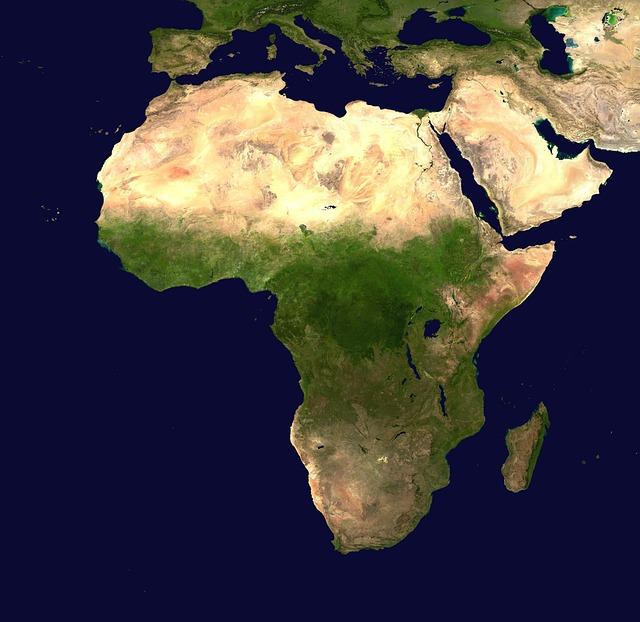In a dramatic escalation in Guinea-Bissau’s tumultuous political landscape, President Umaro Sissoco EmbalĂ³ has been arrested amid reports of a military coup. Soldiers have proclaimed that they have “taken full control of the country,” raising serious concerns about stability in the West African nation. This development marks a significant chapter in a history characterized by political upheaval and instability, with implications that could reverberate throughout the region. As military forces assert their dominance, the international community watches closely, apprehensive about the potential consequences for democracy and governance in Guinea-Bissau. The Africa Report delves into the unfolding events, exploring the political dynamics and the challenges that lie ahead for this small yet strategically significant country.
Guinea-Bissau Faces Political Turmoil Following President EmbalĂ³’s Arrest
In a dramatic turn of events, the arrest of President Umaro Sissoco EmbalĂ³ has plunged Guinea-Bissau into chaos, igniting fears of deepening political instability. Soldiers have declared they have “taken full control of the country,” raising alarms over the future of the West African nation renowned for its tumultuous political history. Key figures, including members of the government and opposition, are urged to navigate this tense landscape cautiously as the military’s announcement sends ripples of uncertainty throughout the region.
The ramifications of this unprecedented situation are already becoming clear. Analysts highlight several critical points stemming from the military’s actions:
- Power Vacuum: The absence of established leadership could lead to a race for power among various factions.
- International Response: Neighboring countries and international bodies are closely monitoring developments, likely to intervene to restore democracy.
- Human Rights Concerns: The potential for civil unrest and violations of rights amid military control poses a serious threat to civilians.
Military Claims Authority Amidst Growing National Instability
The recent arrest of President Umaro Sissoco EmbalĂ³ marks a significant turning point in Guinea-Bissau’s political landscape, highlighting the pervasive instability that has characterized the nation. Soldiers claiming to have seized full control of the country have raised alarms about the practical implications of a military takeover in a region already plagued by political turmoil. As factions within the armed forces assert their influence, the once-fragile governance structure faces unprecedented challenges, prompting concerns among national and international observers about the direction in which Guinea-Bissau is headed.
The military’s declaration of control raises pertinent questions regarding the legitimacy and operational authority of these armed forces. The immediate aftermath has seen a surge in public unease, as citizens grapple with the ramifications of a potential shift away from democratic norms. Key points of concern include:
- Public Safety: In an environment marked by uncertainty, the welfare of civilians becomes a primary concern.
- International Relations: The possibility of sanctions or diplomatic isolation looms, depending on the international community’s reaction.
- Economic Stability: Ongoing instability could deter foreign investment and complicate trade agreements.
While the military claims it acts in the interest of restoring order, historical precedents suggest potential pitfalls. To better understand the implications of military authority under such circumstances, a comparative analysis of military-led governments across West Africa reveals a mixed record of governance:
| Country | Military Takeover Year | Outcome |
|---|---|---|
| Mali | 2020 | Continued instability followed by a transition to civilian rule, albeit with military influence remaining significant. |
| Burkina Faso | 2022 | Ongoing security challenges and strikes, highlighting government’s struggle to address social unrest. |
| Guinea | 2021 | Military junta in power with promises of a transition to civilian rule but significant concerns over governance. |
| Gambia | 2017 | Successful transition back to democracy following an intervention; military influence diminished. |
This table captures significant instances of military intervention across the region, illustrating both the complexities and the unpredictability associated with military rule. The outcomes exhibit a wide range from transient governance issues to lasting democratic successes and failures.
As the situation in Guinea-Bissau evolves, the focus will inevitably shift toward how the international community responds and whether the military can navigate the enterprise of governance without backtracking on democratic ideals. The people of Guinea-Bissau, burdened by the weight of historical legacies of instability, look toward a future fraught with potential as they confront yet another chapter in their nation’s tumultuous history.
International Community Urged to Respond to Guinea-Bissau’s Crisis
The current situation in Guinea-Bissau is increasingly dire, as armed forces have declared they have taken full control of the state, leading to a power vacuum and significant unrest. The arrest of President Umaro Sissoco EmbalĂ³ has ignited concerns over the stability of this West African nation, with citizens facing severe uncertainties about their future. Observers warn that the international community must act swiftly to address this crisis, emphasizing the importance of diplomatic engagement and humanitarian assistance. Key actions for global stakeholders to consider include:
- Immediate humanitarian aid to assist those affected by the turmoil.
- Pressure on military leaders to restore constitutional order and engage in dialogue.
- Support for civil society organizations that advocate for peace and democracy.
International entities such as the African Union and the Economic Community of West African States (ECOWAS) have a pivotal role to play in mediating discussions among conflicting parties to stabilize the region. The implications of inaction could extend beyond Guinea-Bissau, affecting regional security and leading to a humanitarian disaster. A coordinated approach involving:
| Action | Responsible Body |
|---|---|
| Diplomatic negotiations | ECOWAS |
| Humanitarian relief | United Nations |
| Monitoring electoral processes | African Union |
is essential to prevent further escalation of the current crisis. The international community’s timely response could help pave the way towards restoring peace and governance in Guinea-Bissau.
Key Takeaways
In the wake of escalating tensions in Guinea-Bissau, the arrest of President Umaro Sissoco EmbalĂ³ marks a significant turning point in the nation’s political landscape. As soldiers assert their control over the country, the situation remains fluid and uncertain. The implications of this power shift extend beyond Guinea-Bissau’s borders, raising concerns about stability in a region already fraught with challenges. As the world watches closely, the citizens of Guinea-Bissau face the immediate concern of what this means for their future. As developments unfold, the international community will be keen to monitor the actions of the military and the evolving response from regional powers and global stakeholders. The unfolding story in Guinea-Bissau serves as a stark reminder of the fragile nature of governance in West Africa and the persistent challenges faced by nations on the path to democratic stability.







